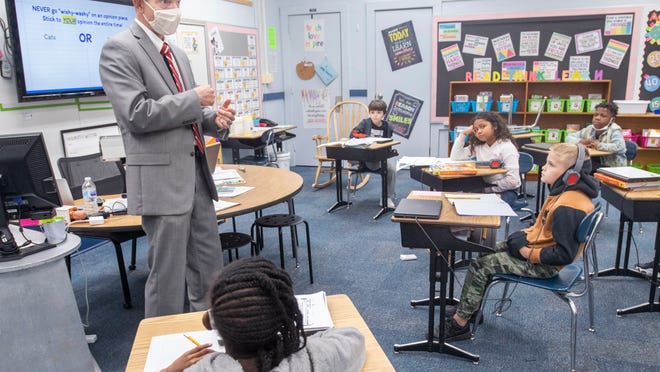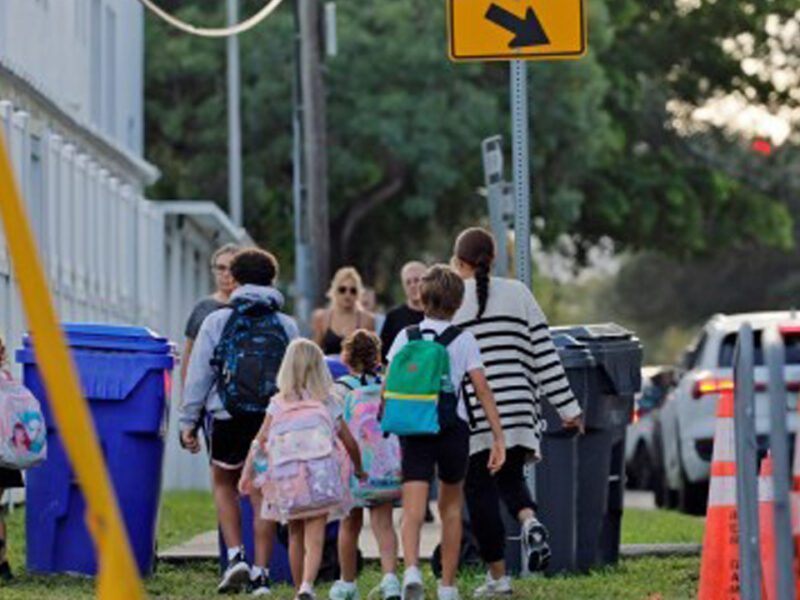Florida state assessments: Principals, teachers decide which students move on if they fail
Pensacola News Journal | by Madison Arnold | April 20, 2021
Teachers and principals in Escambia and Santa Rosa counties will play a bigger role in deciding whether students who fail certain state assessments this year can still either move up a grade or graduate.
In a typical year, third-grade students would need to pass their statewide standardized reading assessments to be promoted to the next grade level, and high schoolers would need to pass standardized geometry and algebra tests to graduate. While Florida Statewide Assessments are still moving ahead, the state has announced that students and schools will not be negatively affected by test scores this year because of concerns over the impact of the coronavirus pandemic.
Instead, schools can determine on a case-by-case basis whether students should be held back if they fail the state assessments. Both local school districts plan to look at different metrics to determine whether a student should advance this year.
“Our teachers are the ones who see the students and interact with the students every day, and sometimes we can use alternative measures to note learning and learning progression,” said Escambia County School District Superintendent Timothy Smith. “The teachers have that very detailed picture and then can work with the principals on making decisions about students’ progression if the scores are in a lower range.”
Statewide assessments cover many different subjects and grade levels and are administered every spring, though they were canceled in 2020. Testing started at the beginning of April, and the bulk will happen throughout May and into June.
Smith said teachers this year will look at the learning progression of students and whether there are intervention opportunities, such as summer school, to supplement a student’s education rather than determine retention based on a test score. In English and language arts, for example, Smith said teachers will be looking at things like changes over a series of essays to show whether students are improving and mastering course material.
“It’s such a serious decision,” Smith said. “We want to do what we can to support and encourage our kids to continue to progress. With all that’s taking place with COVID, and especially with our remote learners who may have not mastered the standards as they normally do, we’re going to be able to provide summer school opportunities for a lot of our kids.”
The district also might blend in some “catching up” material at the beginning of next school year to ensure students know the concepts they should have learned this year.
While the district ultimately decides whether a student is ready to advance, parents are regularly brought into any conversation about retention, Smith said. If any parent is concerned about retention or statewide assessments, they should reach out to their schools to talk about the upcoming year.
“That parent partnership is important,” Smith said. “We always want to encourage parent communication, school communication, that partnership.”
In the Santa Rosa County School District, Superintendent Karen Barber said schools have an ongoing process for intervening when a child might not be performing up to grade level throughout the year.

Gregg Pachkowski/gregg@pnj.com
For students who fail statewide assessments this year, schools will look at whether those students have taken the required courses and have mastered the content. The district will determine that by examining how the student performed on the school’s own tests and coursework.
“Lots of students have test anxiety. Lots of adults have test anxiety. If we can determine through another means other than that one static test that they’ve mastered the content, then we want to afford them the opportunity to graduate or be promoted,” Barber said.
Parents can request their school consider retention if they feel it would be best for their student after this school year, and the district takes that into consideration when making its decision. Barber said the school district works with the students’ families to determine what’s in the best interest for the child.
Barber said for some third-grade readers, another year of that same grade level might be considered, but at least this year, the statewide assessments will not mandate that.
“That is one of the most restrictive and serious decisions we can make with a student. We don’t make it lightly. And we don’t take one single data point to determine if a student is ready to be promoted to the next grade level,” Barber said.
What about school grades?
The state also has ordered that schools will not be held accountable for their student body’s performance on the statewide assessments this year.
In a normal year, both student proficiency and improvement would be calculated together to determine a score for a school, which is assigned to a specific letter grade. If a school receives a poor letter grade, that can trigger the state’s “turnaround” intervention program.
Schools do have the opportunity to opt-in to receive a letter grade once statewide testing is finished if they’ve tested 90% of their students. Smith said that if students happened to perform well at Escambia County’s four turnaround schools, they could apply for the letter grade and potentially ease the restrictions.
He said the district will look at the statewide assessment data during the summer and determine whether to apply.
“There may be some schools that they might have needed a few points and they get that dump,” Smith said.
None of the public schools in Santa Rosa County are in the turnaround program. Instead, Barber said her district is looking at whether to apply for school grades as a way to be more transparent to the public and parents.
“For them to see how our schools functioned and performed this year is important,” Barber said.
Featured image: New Escambia County School District Superintendent Timothy Smith meets faculty and students during a visit to Brentwood Elementary School in Pensacola. Gregg Pachkowski






